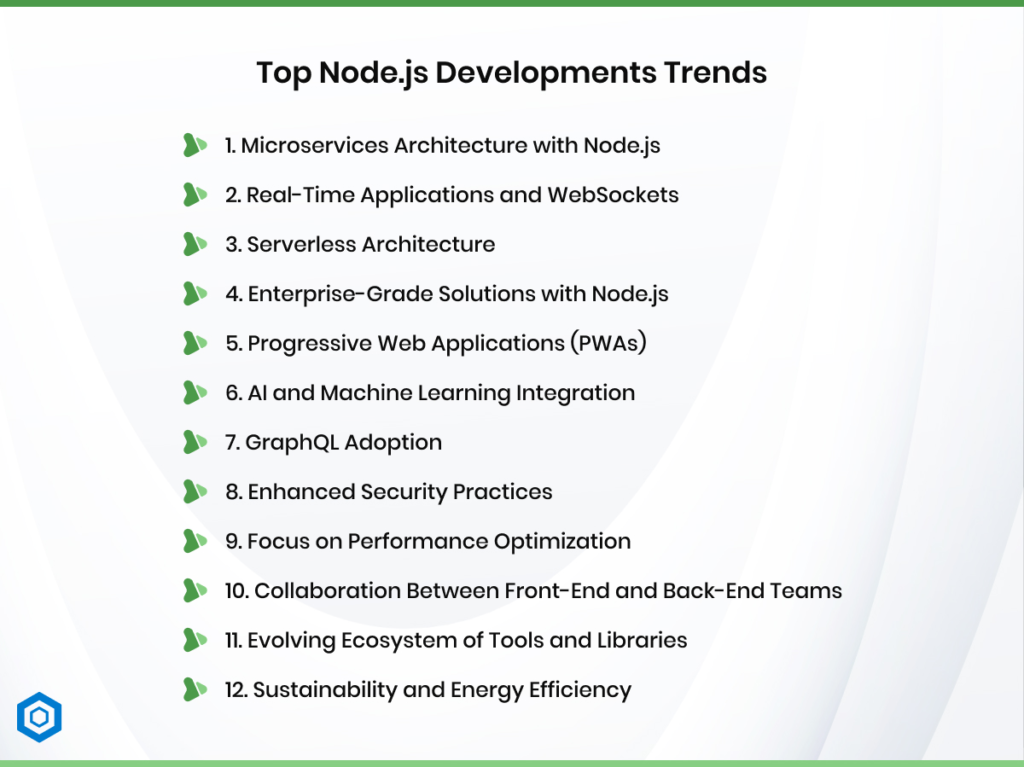
Node.js Development Trends: What's New and Exciting
07 JANUARY
Introduction
In the today’s hypothetical world of software development environment, it is very important to update oneself in terms of new technologies and new ways. Fast and reliable Node.js can be presented as the basic kits for developing various modern applications. As an open source, cross platform runtime environment, it has been relied on by many back-end development firms for creating complex applications. With dynamic user demands as the businesses strives to achieve, the companies look to a reliable Node.js development company. According to the survey, 40.8 percent of respondents reported to be using Node.
What is Node.js Development?
Node.js is an open-source server environment built on the Chrome V8 JavaScript engine, used for creating next-generation networking applications that attain peak performance. This is in contrast to vanilla JavaScript which is web-based and runs in the clients browser and sheds light on how Node.js enables developers to write server side applications using JavaScript. It employs an event-driven, non-blocking model and is not thread-bound so it is ideal for real time applications.
Node.js is popular among web development and back-end development firms as they prefer an environment that can handle multiple requests without lag. It is particularly used while developing APIs, microservices or data-oriented applications due to the high speed of its work and its capacity for scaling.
Huge libraries and tools supporting this language along with its flexibility to support front-end frameworks make it popular among businesses. Whether you’re a new company, or an enterprise, partnering with a Node.js development company, or hiring Node.js developers can help future-proof your applications.
Top Node.js Developments Trends

- Microservices Architecture with Node.js
Microservices architecture is progressively finding its way to change the notion on how software development is conducted. Due to its lightweight structure, Node.js is a go-to pick for building P2P decentralised and highly scalable micro-services. In this approach, applications can be divided into smaller services that can be managed easily so that back-end development companies can work on efficiency and fault tolerant interims.Trend Impact: Microservices allow individual teams to be responsible for developing and incorporating specific sections that lead to improvements in application performance. Sometimes, companies applying this trend hire Node.js developers, because the architecture of this frame is based on events for communication between services. - Real-Time Applications and WebSockets
The necessity of using such features in real-time applications, including live chats, online gaming, and stock trading platforms, has risen. Node.js is particularly suitable for real-time web applications as it supports non-blocking I/O and WebSocket. This makes this capability to enable two-way communication between servers and clients, thus making the updates as immediate as possible. Trend Impact: Interactivity in real-time has become one of the essential aspects to consider when addressing users. These features sometimes need proper implementation, and for this reason, businesses have to work with a Node.js development company. - Serverless Architecture
Serverless computing is one of the most transformative models currently in use for application deployment and management. Due to integration with the AWS Lambda and Google Cloud Functions, Node.js is an excellent choice for developing serverless apps. This trend eliminates the need to manage infrastructure, which will cut on operation expenses.
Trend Impact: A company that is involved in back-end development can take advantage of the serverless architecture solution within the organization in terms of cost and flexibility. Many organizations have implemented this trend by hiring Node.js developers with serverless framework. -
Enterprise-Grade Solutions with Node.js
In the present world, businesses are focusing and relying on Node.js for large-scale, high-reliable applications. Because of its flexibility and the extensive range of interconnected dependencies, it is effective in addressing diverse and multiple corporate requirements. Node.js frameworks such as NestJS and LoopBack are widely used in the creation of enterprise solutions among all types.Trend Impact: Businesses collaborating with a Node.js development company acquire knowledge and support in the development of highly effective and secure applications with numerous functionalities. It is changing the nature of how organizations design their software development and deployment.
-
Progressive Web Applications (PWAs)
PWAs are effectively the app like web interfaces operating in web browsers and can be made by Node.js which is an amorous technology stack. PWAs created with Node.js are fast loading, offline capable and optimized for mobile devices.Trend Impact: Through the use of PWAs, businesses target appropriate consumers much efficiently while having to spend less on development. Integration with front-end developers familiar with Node.js frameworks guarantees perfect perceptions.
-
AI and Machine Learning Integration
Node.js is gradually gaining grounds when it comes to incorporating artificial intelligence AI and machine learning ML functionalities. Oftentimes, there are ML frameworks such as TensorFlow.js, through which the models can be run within Node.js applications.Trend Impact: Machine learning for Node.js: If we combine AI with Node.js, we have possibilities to use some prediction algorithms, recommendation systems, and utilizing natural language. Those organizations and enterprises which seek to innovate approach a Node.js development company in these fields.
-
GraphQL Adoption
Increasing in popularity, the GraphQL language is rapidly becoming an equal to the REST API as languages. Additionally Node.js features support for GraphQL, making it simpler for developers to create strong and efficient APIs.Trend Impact: Using GraphQL improves the data loading process and minimizes cases of excessive and redundant data retrieval. Back-end development companies often adopt Node.js to apply this API structure for the modern application.
Discover the impressive projects we’ve completed with Node.js. Visit our portfolio
-
Enhanced Security Practices
As cyber threats evolve, security is always an important factor in the development of the software. To a large extent, Node.js developers are now implementing measures such as data encryption, safe authentication, and frequent checks for dependencies.
Trend Impact: Incorporation of security measures into an application necessary for the protection of the user data and to ensure that the application is legal can be made possible after hiring a competent Node.js development firm -
Focus on Performance Optimization
Performance optimization is a recurring focus area for Node.js development. Techniques like clustering, caching, asynchronous programming makes the application more efficient and fast.Trend Impact: Companies that hire a competent back-end development company that has vast experience in using Node.js can develop excellent business applications that will offer the best services to the clients.
-
Collaboration Between Front-End and Back-End Teams
Front-end and back-end programming should work well together to achieve good web development outcomes. Node.js manages to fit the gap in a competent way; front-end developers and back-end teams respond positively to it.Trend Impact: Integrated work and information flow lead to coherent application design. To create this synergy, companies hire Node.js developers capable of closely collaborating with front end developers
-
Evolving Ecosystem of Tools and Libraries
The usage and development of Node.js has expanded impressively and other tools, libraries and frameworks are being created. Process Management 2 is now available for developers as well as Sequelize for easier database management, and Mocha for testing which guarantees good development environment.Trend Impact: An increasing number of participants brings benefits to software development teams, enabling them to create unique, valuable apps. Working with a Node.js development company means working with people who are familiar with the up-to-date tools.
-
Sustainability and Energy Efficiency
There is a new phenomenon of sustainability in application development process. Rather than focusing on cpu utilization, runtime impact, Node.js brings an influence to sustainable design for web applications on energy consumption on served devices.Trend Impact: Businesses integrating sustainable development solutions seek Node.js developers who appreciate environmental conservation in coding.
Conclusion
Node.js is still on the frontlines when it comes to the development of software solutions in a number of sectors. Pursuing such trends as microservices, real-time applications, serverless architecture, and security business will put the competitors ahead of others. Working with a reputable Node.js development company or choosing to hire Node.js developers means getting in touch with professionals and innovative solutions. As Node.js continues to improve constantly, many opportunities for web development are being rebuilt, which makes Node.js indispensable for some modern developers.
Looking for an efficient and dependable provider to leverage the Latest Node.js Trends for your application development? Contact US.
Frequently Asked Questions
Speed, scalability, and great support by a variety of tools make Node.js suitable for almost any modern web development project. Companies seek to hire a Node.js development company in order to fully utilize its capabilities.
Node.js developers mostly focus on optimized and scalable apps depending on business requirements. The benefits of hiring them are, there will be proper knowledge of dealing with back end work, real time applications etc.
Its asynchrony results from the fact that Node.js, accompanied by thousands of libraries, was intended for back-end development companies to build fast and scalable products.
Despite the fact that Node.js is employed primarily for back-end tasks, its integration characteristics let front-end work interact with back-end employees to optimize application processes.
Application domains such as e-commerce, fintech, healthcare, social media to name a few, positively leverage Node.js in terms of real time functionality, scalability and richer application support.





